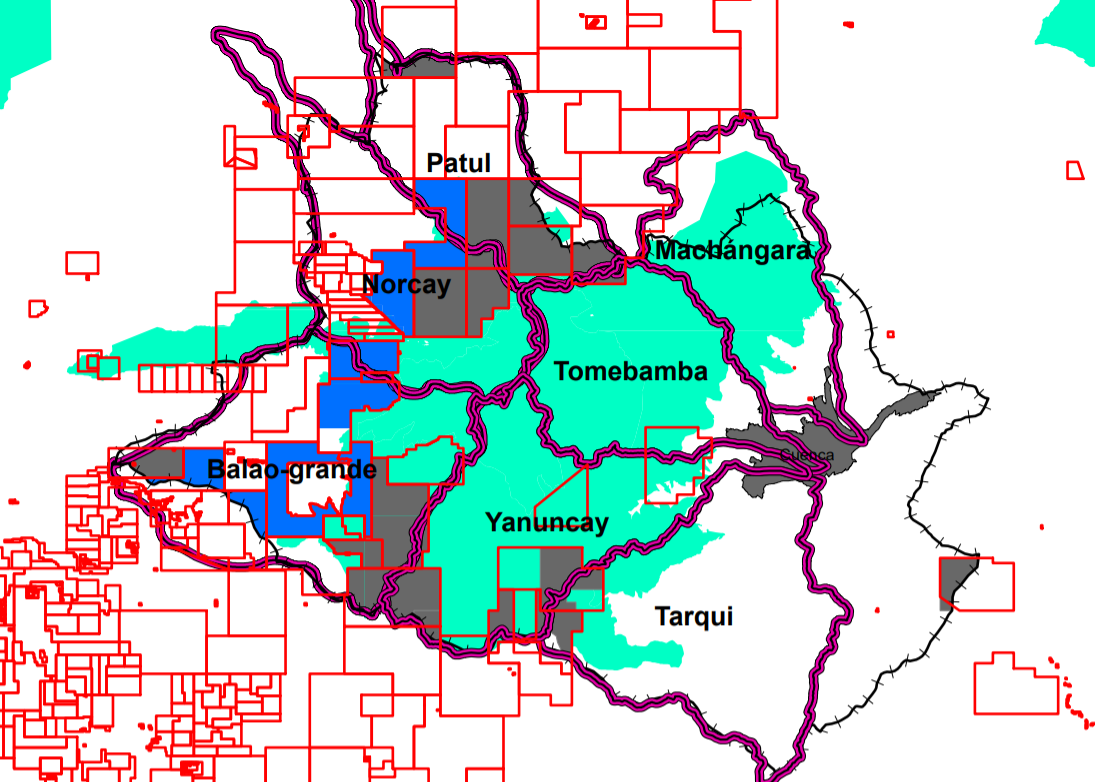- On February 7th, over 80% of the population of the southern Ecuador canton of Cuenca voted “no” to industrial mining in the watersheds of 5 rivers surrounding the city of Cuenca. Canadian company INV Metals is directly affected by the results.
On Sunday, February 7th, over 400,000 residents of the canton of Cuenca in Southern Ecuador went to the polls to defend their water and lives against metal mining, voting in overwhelming opposition to industrial mining in the watersheds of the area’s 5 rivers.
INV Metals was one of the targets of the citizen-led initiative, which demanded a plebiscite vote in order to express to the company, and the world, that the city of Cuenca and its surrounding communities do not want mining. The company’s continued push to develop its Loma Larga project amidst widespread and long-standing opposition has long fanned the flames of resistance. Sunday’s results highlight this fact, with over 80% of the population voting to protect water against industrial mining activities.
Although the results affect all mining activities in the region, they will prove particularly significant for INV Metals. The mineral deposits of the company’s flagship Loma Larga project are situated within the canton. In addition the company recently relocated all of its infrastructure and installations to the canton following a 2019 plebiscite vote in the neighbouring canton of Girón, which also voted “no” to mining. Now, with the clarity that this constitutionally-backed decision brings, the company will have no other choice but to respect the will of the citizens and abandon the project once and for all.
Members of the pro-mining lobby have attempted to disqualify the plebiscite process by saying that it won't be retroactive and will thus only apply to new mining operations. The President of the Azuay Chamber of Mines, Patricio Vargas, said that the consultation would not be retroactive and as such, “would not affect projects like Loma Larga.”
However, Loma Larga is not yet in operation. Although INV has the rights to the underlying concessions, it has not yet applied for its exploitation licence, the permit which allows construction and production. The project is still in the permitting stage as it awaits the licencing process around its Environmental Impact Assessment. In January 2021, the company denied a request submitted by several organizations from the region to make the results of the EIA public.
David Fajardo, a lawyer and member of the collective Yasunidxs Cuenca, one of the organizations which backed the plebiscite vote, noted to the press earlier this week that the results will apply fully to Loma Larga:
“In Cuenca, the only project that is in the exploitation phase is “Rio Blanco”, but this mine is suspended indefinitely. The rest of the projects like “Loma Larga” are not yet in the exploitation phase, and, as such, the results of the consultation will affect them fully.”
This position was reaffirmed by the mayor of Cuenca, Pedro Palacios, who noted publicly that his legal advisors have made it very clear that the language of the plebiscite was “clear” that any projects in the exploration phase, like Loma Larga, would not be permitted to move forward.
The company appears to maintain its position that it will continue to pursue the project regardless of the plebiscite results. Jorge Barreno, INV Ecuador’s General Manager, said that it has a constitutional right to continue to develop the mine, echoing its past position that these plebiscites are non-binding.
Regardless, beyond the legal interpretation of the vote, there lies a much bigger issue of popular resistance and struggle. With two successful plebiscites now opposing its activities, it is clear that Loma Larga does not have residents’ consent to continue its work in the region. Any continued activities will surely be perceived as in violation of the popular will that continues to be expressed. The plebiscite coincides with the recent results of the first round of Ecuador’s presidential elections, which put an explicitly anti-mining candidate, Yaku Pérez, in second place, with over 20% of the national vote, emphasizing that this opposition is not exclusive to the southern part of the country.
The people of Ecuador are cultivating a movement to protect their water and their environments from becoming the next mining-produced sacrifice zone. Mining companies and the foreign governments, like Canada, who promote them need to take notice. This movement is not going away.
For more information or to set up interviews with organizations in Cuenca contact Viviana Herrera, viviana@miningwatch.ca
